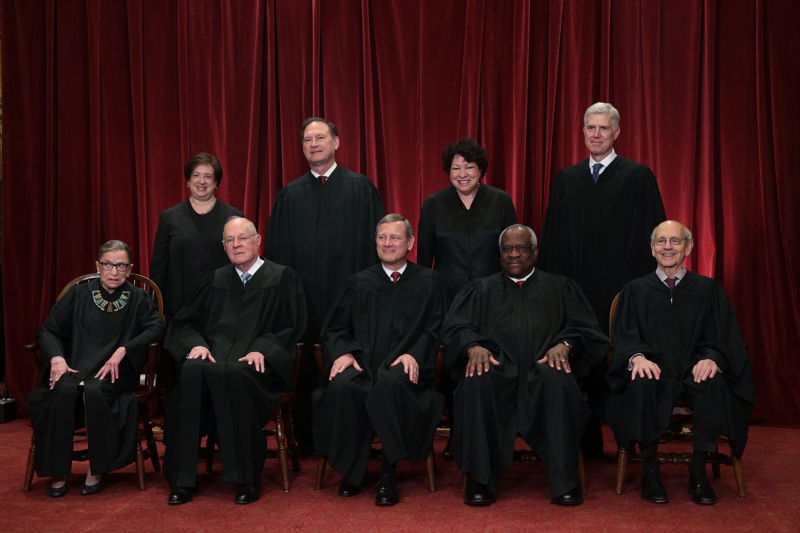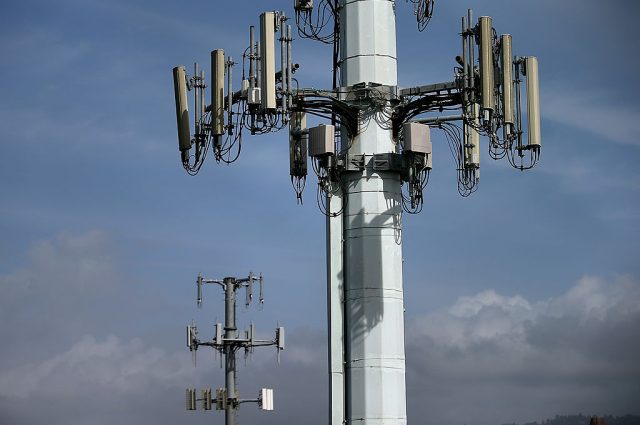
The Supreme Court's 2017-2018 term begins today, and there are plenty of high-interest cases for Ars readers that are already on the docket or currently pending with the justices. The issues at hand range from surveillance, freedom of religion, and the definition of hacking to what constitutes an online threat and whether a federal law that bans sports wagering in most states—online and off—infringes on states rights.
One of the cases in particular is perhaps the biggest privacy case to have reached the court in the Digital Age. Carpenter vs. United States asks a far-reaching question: do the authorities need a probable-cause court warrant to access people's mobile phone location history? Warrantless mobile phone tracking has become a mainstay of the American surveillance state following the high court's 2012 ruling that warrants were needed for the authorities to place GPS trackers on vehicles.
And beyond the case content, the 2017-2018 term is also notable because the court is again back at full strength with nine justices. The Trump administration nominated judge Neil Gorsuch at the start of this year to fill the seat vacated after the death of Justice Antonin Scalia in February 2016. The Senate confirmed Gorsuch in April. While his prior decisions and opinions may provide a hint at where the new justice stands on issues before the court, such as privacy and online speech, this will be Gorsuch's first full term at the court.
So at the start of this new term, and new era for the court, these are the cases we'll be watching closest.
Third-party doctrine

Before you can understand the complexities of Carpenter, the case noted above, you need to understand the basics of how cell-site location tracking has worked in practice. To start, it takes advantage of a device—the mobile phone—that almost everybody keeps with them at all times. And because of a quirky interpretation of the law, US authorities have been obtaining data pinpointing the cell towers that a person's mobile phone pinged without a warrant. No Fourth Amendment, probable-cause standard that a person might have committed a crime has been necessary to access such information, and this data has consequently been used as evidence in court. In Carpenter, for instance, authorities got 127 days of cell-site information that included 12,898 location points.
Carpenter (PDF) revolves around a Detroit robbery investigation. Timothy Carpenter was one of two men convicted of aiding and abetting a string of robberies. Cell-site data placed the men near the robberies of Radio Shack and T-Mobile stores in and around Detroit.
A federal appeals court dismissed the men's contention that a probable-cause warrant under the Fourth Amendment was needed by the authorities to access their cell-site location data. The appeals court said (PDF) that the only requirement necessary for the cops to get the data was that they had to have asserted that the information was "relevant and material to an ongoing criminal investigation." And that's what investigators did. They told a judge they needed the information as part of their robbery investigation.
The Cincinnati-based 6th US Circuit Court of Appeals noted in its ruling that if Congress thought Americans should enjoy a privacy interest in their third-party data, Congress is free to legislate it. Legislation toward that end was introduced in February, but it went nowhere in Congress.
Currently, the so-called third-party doctrine is what allows these intrusions into private data. (The third-party doctrine was famously the government's legal basis for the telephone metadata snooping program unearthed by Edward Snowden.) The doctrine, upheld for decades by the Supreme Court, gives the OK for the government to demand that companies hand over private information on people if that information is considered an everyday business record. Because cell-site data is deemed a business record of the mobile phone companies, the telcos are required to disclose it as part of government investigations. Again, probable cause warrants are not required.
Given the privacy ramifications, a high-profile group of tech companies (including Apple, Google, Microsoft, and others) collaborated on friend-of-the-court filings for the case in August. The group argues in favor of stronger legal protections for data generated by apps and digital devices, stating that the current state of the law—which distinguishes between "content" (which requires a warrant) and "non-content" (which does not)—"make[s] little sense in the context of digital technologies."
Now the third-party doctrine is squarely in front of Supreme Court. The issue was previously before the justices when they ruled in 2012 that GPS trackers required warrants, but the court skirted the third-party doctrine issue then. Instead, the majority ruled at the time that the act of police affixing a GPS device to a vehicle amounted to trespassing—so warrants were required.
In a concurring opinion in that GPS case, Justice Sonia Sotomayor suggested that the third-party doctrine was "ill suited to the digital age, in which people reveal a great deal of information about themselves to third parties in the course of carrying out mundane tasks."
Everybody’s a winner

Another high-impact case the justices have agreed to decide this term concerns a 1992 federal law prohibiting the states—except for Oregon, Nevada, Montana, and Delaware—from allowing sports betting whether at a casino or online. If the justices set aside the Professional and Amateur Sports Protection Act (PASPA), gamblers could wager on their favorite teams right from their home computer—no need to log in to some overseas, shady online casino. The modern-day, at-home Sin City awaits the high court's decision.
Christie v. NCAA stems from the New Jersey governor's efforts to allow his state's casinos and racetracks to conduct sports betting—an initiative that began six years ago. Christie believed this would generate millions for New Jersey, but he soon became the target of a lawsuit from a collective of nearly every major sports league, the NFL, NBA, MLB, NHL and NCAA. The group argued that such a law would conflict with PASPA.
Sports Illustrated notes that the Justice Department soon joined the effort of these sports leagues. The courts initially sided with the leagues, and New Jersey appealed all the way to the Supreme Court.
I. Nelson Rose, one of the nation's leading gambling legal scholars, told Ars in an e-mail that if the justices ultimately side with New Jersey, gambling would expand exponentially across the globe.
"There would then be no reason for the federal government to interfere if states want to legalize any form of gambling," he said. "They should be able to make agreements with other states and even other nations for Internet gambling."
The legal defense that New Jersey is invoking centers on the 10th Amendment, which says that the "powers not delegated to the United States by the Constitution, nor prohibited by it to the States, are reserved to the States respectively, or to the people." This is code for "states rights." The PASPA prohibits states from authorizing "a lottery, sweepstakes, or other betting, gambling, or wagering scheme" based "on one or more competitive games in which amateur or professional athletes participate."
New Jersey told the Supreme Court that the lower courts' rulings on the matter are "in direct conflict with this Court's Tenth Amendment jurisprudence barring Congress from controlling how the States regulate private parties."
Alternatively, the leagues have claimed that PASPA was a valid and legitimate exercise of congressional authority.
"And although Congress has accommodated limited state interests in legalized gambling, it has not strayed from its view that sports gambling is particularly damaging. When Congress exempted state lotteries from federal criminal lottery laws in 1975, for instance, it excluded state-sponsored sports gambling from that exemption, making clear that federal laws would continue to apply to 'placing or accepting of bets or wagers on sporting events or contests' conducted by states," the leagues told the court.
reader comments
183